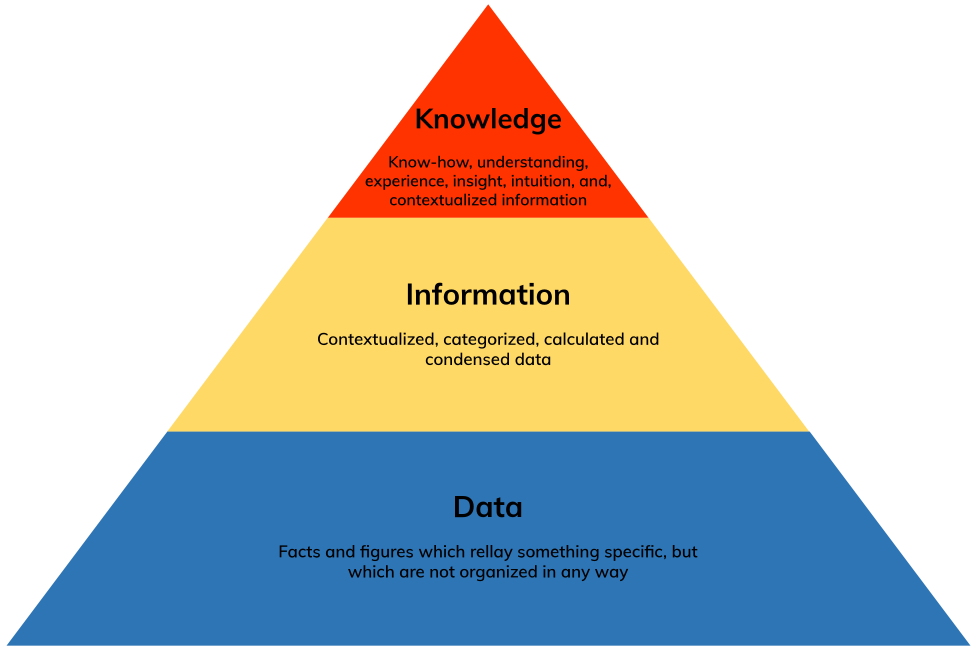Before one can begin to talk about knowledge management (KM), one must start by clearly defining the meaning of the word "knowledge". It is important to understand what constitutes knowledge and what falls under the category of information or data. Unfortunately, this is a more difficult task than may be apparent at first. Within everyday language, within specific fields, and even within the same disciplines, the word "knowledge" often takes on a variety of meanings.
HELPJUICEAD
Perspectives on Knowledge, Information, Data
In everyday language we use knowledge all the time. Sometimes we mean know-how, while other times we are talking about wisdom. On many occasions we even use it to refer to information. Part of the difficulty of defining knowledge arises from its relationship to two other concepts, namely data and information. These two terms are often regarded as lower denominations of knowledge, but the exact relationship varies greatly from one example to another.
Within more technologically oriented disciplines- particularly involving information systems- knowledge is often treated very similarly to information. It is seen as something one can codify and transmit, and where IT plays a pivotal role in knowledge sharing. For instance, the encyclopedia at fact-archive.com defines it as: "information that has a purpose or use."
This kind of simplistic view of knowledge was particularly widespread during the 90s when information technology became increasingly more common. However even today, some KM systems are little more than information management systems using knowledge as a virtual synonym for information.
To illustrate, Theirauf (1999) defines the three components as follows: data is the lowest point, an unstructured collection of facts and figures; information is the next level, and it is regarded as structured data; finally knowledge is defined as "information about information".
However, increasingly one sees definitions that treat knowledge as a more complex and personal concept that incorporate more than just information. The Longman online dictionary has one definition that begins to approach the way that knowledge is usually regarded within KM. It states "the information, skills, and understanding that you have gained through learning or experience." Although still closely associated with information, concepts like skills, understanding, and experience begin to surface.
Defining Data, Information, and Knowledge
Below, I have included the definitions that will be used throughout this site.

Data: Facts and figures which relay something specific, but which are not organized in any way and which provide no further information regarding patterns, context, etc. I will use the definition for data presented by Thierauf (1999): "unstructured facts and figures that have the least impact on the typical manager."
Information: For data to become information, it must be contextualized, categorized, calculated and condensed (Davenport & Prusak 2000). Information thus paints a bigger picture; it is data with relevance and purpose (Bali et al 2009). It may convey a trend in the environment, or perhaps indicate a pattern of sales for a given period of time. Essentially information is found "in answers to questions that begin with such words as who, what, where, when, and how many" (Ackoff 1999).
IT is usually invaluable in the capacity of turning data into information, particularly in larger firms that generate large amounts of data across multiple departments and functions. The human brain is mainly needed to assist in contextualization.
Knowledge: Knowledge is closely linked to doing and implies know-how and understanding. The knowledge possessed by each individual is a product of his experience, and encompasses the norms by which he evaluates new inputs from his surroundings (Davenport & Prusak 2000). I will use the definition presented by Gamble and Blackwell (2001), based closely on a previous definition by Davenport & Prusak:
“Knowledge is a fluid mix of framed experience, values, contextual information, expert insight, and grounded intuition that provides an environment and framework for evaluating and incorporating new experiences and information. It originates and is applied in the mind of the knowers. In organizations it often becomes embedded not only in documents or repositories, but also in organizational routines, practices and norms.”
In order for KM to succeed, one needs a deep understanding of what constitutes knowledge. Now that we have set clear boundaries between knowledge, information, and data, it is possible to go one step further and look at the forms in which knowledge exists and the different ways that it can be accessed, shared, and combined. I will discuss this in the section titled "The Different Kinds of Knowledge".



